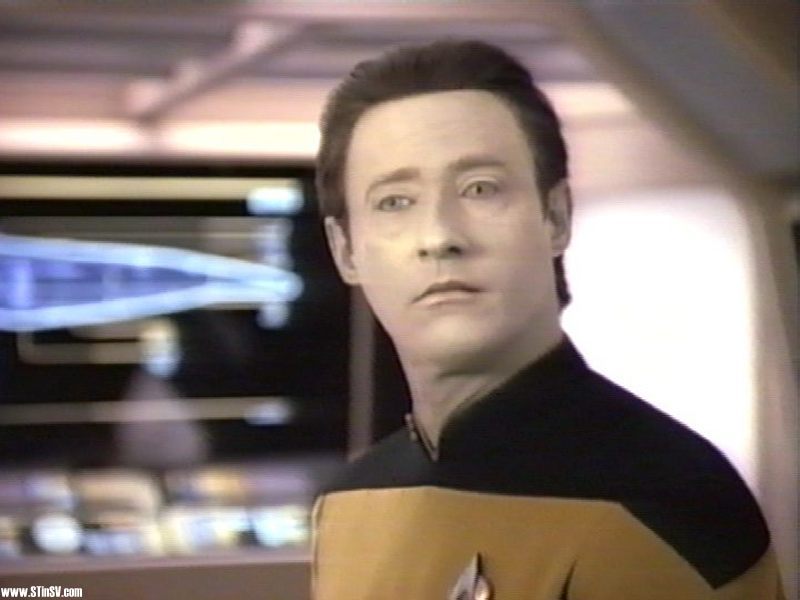
Star Trek: The Next Generation brings to light many questions about humans in relation to technology, especially concerning the android, Data. The Episode we saw, "The Measure of a Man", made me realize that the more human-like we make our technology to be, the more difficult it will become to distinguish between what is real and what is not. This is what Borgmann had to say throughout much of his work...finding a balance between information and reality. Unfortunately, the more inundated we are with near-copies of reality, the more confusing it will be to try and distinguish between what is real and what isn't. Reality will seem "too heavy" to be dealt with in all its entirety.
Data, in the Star Trek episode, is not supposed to have any emotion, but when questioned about his possessions, it seems that things and people really mean something to him. There was even a different in the Primary Commander calling Data "him", while the antagonist called Data "it", a "machine". Where do the boundaries lie when something looks and acts just like a human being, but really isn't on the inside? Our head might realize that Data is not human, but our heart might have a harder time understanding this.
Humans being s are endowed with souls at the moment of their conception, something that machines cannot contain. Data was created by a genius human being, who does not have this power to grant a soul. Data is limited to the abilities and will of his creator, and limited by what can and cannot be possibly programed into him. Yes, human beings are a type of biological "machine", but we are more than that. We are different from every species of the animal kingdom, and we are definitely unique from machinery. Human beings are created in the image and likeness of God, and they are given a soul and a possible share in God's divine life. This is something that androids are lacking.
Although the arguments made in the courtroom about giving Data the same rights as a human being, I cannot bring myself to see Data in this manner. Being able to merely imitate human beings through programming does not make the cut in determining whether someone is human or nonhuman. Data could merely be adjusting to the environment around him everyday, and begins to imitate emotional responses he finds in humans.
Data does have the ability to reflect on his own existence and see that he is different from those around him. Data has self awareness. This does not, however, make him an independent being, capable of rational thought. How do we know for sure that Data is having rational thought? It seems that we cannot get entirely acquainted with the complex processes that occurs every second in Data's mind. It is too much for us to fathom.
We do have to be careful how we treat androids, as they resemble human beings quite closely. The way we begin to treat androids may begin to be reflected in the way we treat each other, so we should continue to treat them with respect...not only for their sake, but for ours. Androids, though seemingly devoid of emotion deserve the respect of being incredible achievements of humanity, a reflection of how far we have come in the technological world. The only caution is in how we use them and treat them.
1 comment:
This was a very insightful article. I am inclined to think that perhaps at the point in time when man can create such a human-like being as Data, God will allow man to breathe into that technology a bit of the soul that God breathed into Adam and Eve. Just as every new child born is imbued with a human soul by God through his parents, perhaps each new android will be thus made human by God through his creator.
I am neither a theologian nor a scientist; I simply present a possible alternative viewpoint. Actually, I'm a 17-year-old student from a small town who fancies herself a poet. I do really appreciate the article. My dad was a huge Star Trek fan, and I used to watch it with him all the time.
Post a Comment